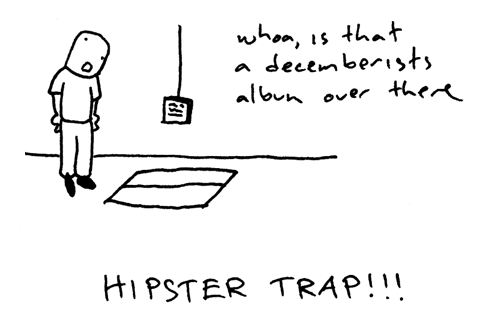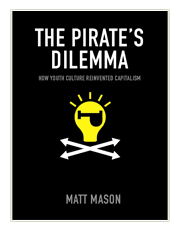
Last Night in the Hipster Trap
Although Toronto’s Tranzac Club was founded in the 1930s as a place for the preservation of Australian and New Zealand culture, it’s also a Hipster Trap.
The club is located in the neighbourhood known as The Annex, a tree-lined old residential neighbourhood close to the University that’s home to both students and faculty. Bloor Street, Toronto’s main east-west street is its southern border, and as a result, the stores, restaurants and bars tend to cater to the crowd that likes to hang around university neighbourhoods. Hence the high concentration of Hipster Traps.
I was at the Tranzac Club along with my wife, the lovely Ginger Ninja, to see my old college buddy Karl Mohr, who was performing his songs on solo piano as the opening act for the Parkdale Revolutionary Orchestra. Karl’s performance could be described as a goth vaudeville musical act (imagine Peter Murphy dressed as a warrior from Dune, while the Parkdale Revolutionary Orchestra turn pop on its ear by combining orchestral instruments and arrangements with operatic vocals and not-quite-conventional song structures.
I wasn’t just an audience member, either — I was also there to provide accordion backing and a solo for Karl’s final number, a maudlin-yet-catchy tune titled Can Your Remains Be Buried With Mine? For this number, Karl stepped away from the piano and sang while guitarist Ian Revell and I backed him up. He got a volunteer from the audience to participate in some pantomime, “dying” through the song’s four verses.
It was the last place I expected to hear a conversation about Facebook development.
Overhearing an Unlikely Developer
After joining Karl for his last number, there was the usual between-act shuffle as people went to the bar to get more drinks, to go to the bathroom or to chat with their friends. My cold was getting worse, so I figured I wouldn’t be able to stay for the full main act. We took a couple of seats near the door, and as I sipped the last of my beer, I overheard a conversation at the next table.
“Everybody’s on Facebook now. We’re supposed to be one of the biggest Facebook cities on the planet [for a while, we were the city with the most Facbookers, but we’ve since been beaten out by London. We’ve still got them beat on a per-capita basis]. It’s so big that I think I’m going to learn PHP just so I can write a Facebook application.”
I turned to see who was talking. The would-be Facebook developer was a woman in her twenties, in a brown t-shirt and wearing art school glasses, with her hair pulled back into two meatball-shaped ponytails. Probably a fan of Clap Your Hands Say Yeah or maybe even Danielson Famile if my busker senses are still working. She said that even though she hadn’t written a program since a computer class in high school, she had an idea for a Facebook app.
I don’t want to give away her idea before she’s even had a chance to try and make it real, but it should be enough to say that it’s cutesy-girly and no guy I know would ever install it (not even the gay ones), but I’m quite sute that she and her friends — the target audience for her app — would love it.
It’s one thing to see the Usual Suspects of Toronto’s tech community, the TorCampers — a large and active community of techies, marketers, entrepreneurs and others who work in high tech — express interest in developing Facebook apps at our usual gatherings as well as special get-togethers like the recent FacebookCamp. It’s something else to see someone outside our field say that she wants to learn some programming so that she can build a Facebook app for her and her friends. I don’t think I’ve seen a platform get a non-developer this excited about programming since HyperCard.
The Facebook API’s 3-Month Anniversary
It’s hard to believe that only three months have passed since the Facebook API was made available to the general public. In that short time:
- A number of Facebook developer get-togethers, including FacebookCamp Toronto, which was attended by over 400 people, have taken place. Facebook has flown representatives to some of these gatherings, including the Toronto one.
- Over 3,000 Facebook-approved applications written, with who-knows-how-many more that haven’t yet been submitted for review.
- The number one Facebook app, Top Friends, has been over 13 million users. Just under 50 apps have netted 1 million installations. The next 100 in rank have a total of over 100,000 users.
- The avenues connecting money to developers keep coming: there are a number of ad networks looking to place ads in facebook apps and venture capitalists seeking out developers to pair up with cash.
I wonder what we’ll be saying once the six-month anniversary rolls around. Hey, I wonder what I’ll be overhearing from unlikely developers come that time.
 I was most amused by this comment made in response to the Engadget article about Acer’s announcement that they plan to acquire Gateway:
I was most amused by this comment made in response to the Engadget article about Acer’s announcement that they plan to acquire Gateway:




 What’s a blog for, if not to toot one’s own horn, or at least the horn of the company for whom he is a spokesmodel?
What’s a blog for, if not to toot one’s own horn, or at least the horn of the company for whom he is a spokesmodel?